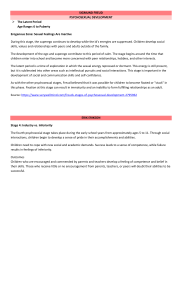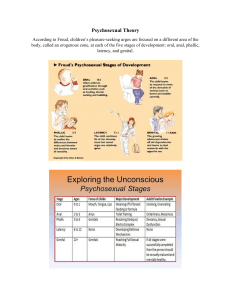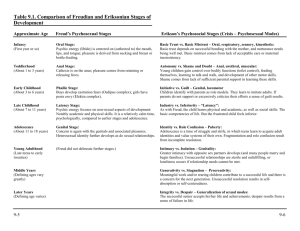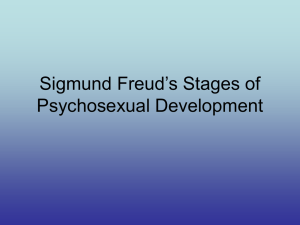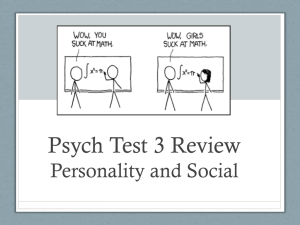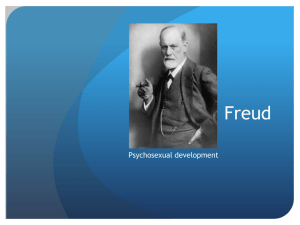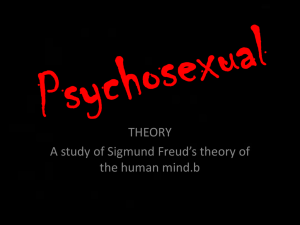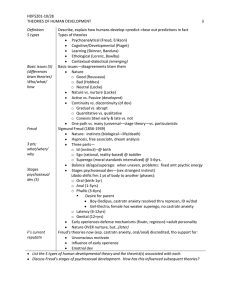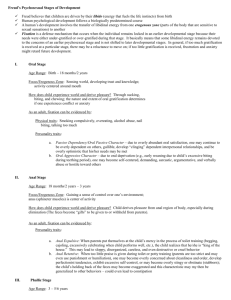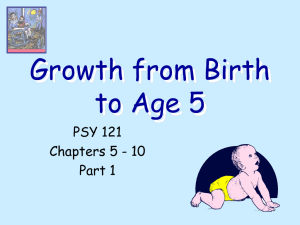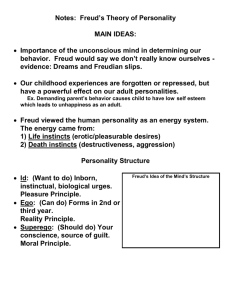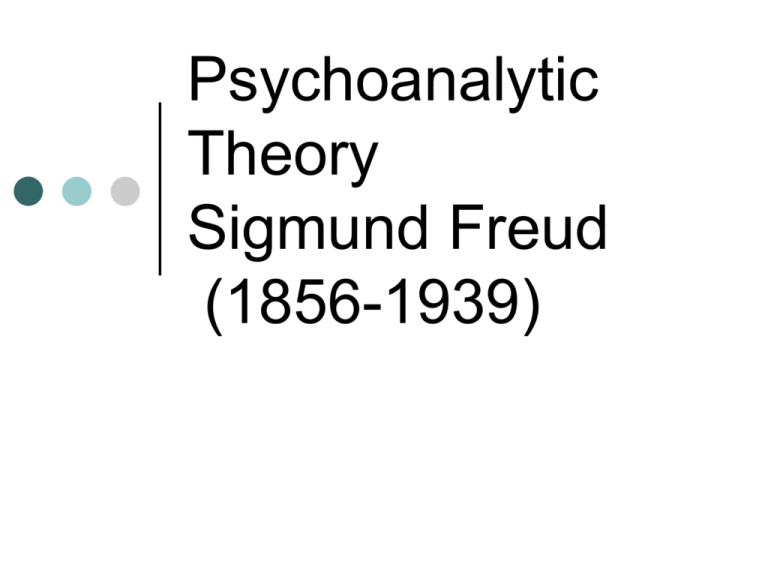
Psychoanalytic
Theory
Sigmund Freud
(1856-1939)
Psychic determinism
This principle holds that in all mental
functioning nothing happens by
chance.
Everything a person feels, thinks,
fantasizes, dreams, and does has a
psychological motive.
What Freud believed……
Everything you do is motivated by inner
unconscious forces.
We are driven by the libido or sexual energy
(sometimes referred to as psychic energy).
Aggression and libido are tied together.
Other laws of energy are the pleasure
principle and the reality principle
What Freud believed……
Personality is formed in the first six
years of life.
Fixation is an unresolved conflict
caused by frustration.
Defense mechanism.
The human psyche
Id
ego
superego.
Anxiety may be present from
conflicts between the id, ego,
superego.
Freud
Psychosexual Stages of Development
Primary focus is on social/emotion
development. (Personality theory).
Past traumatic experiences highly influence
personality development.
At particular points in the developmental
process, he claimed a single body part is
particularly sensitive to sexual, erotic
stimulation.
These erogenous zones are the mouth,
the anus, and the genital region.
The child’s libido centers on behavior affecting
the primary erogenous zone of his age; he cannot
focus on the primary erogenous zone of the next
stage without resolving the developmental conflict
of the immediate one.
The Oral Stage
From birth to about 18
months
Infants’ pleasure comes from stimulation of the mouth.
If we get fixated at this stage, we might have oral
fixations.
Characteristics of frustration at this stage, (mother
refused to nurse on demand or truncated nursing
sessions early) are pessimism, envy, suspicion, and
sarcasm.
The overindulged oral characteristics, (nursing urges
were always and often excessively satisfied) are
optimistic, gullible, and full of admiration for others
around him.
I.E. gum chewing, smoking, etc.
The Anal Stage
18 months to 3 years.
The child turns his attention to elimination
functions. This is potty training time. A child can
express themselves by holding on or letting go of
their bowel movements.
This can be used as manipulation for what they
want.
If parents are too lenient, and the child manages
to derive pleasure and success from an expulsion,
the result is the formation of an anal expulsive
character. This character is generally messy,
disorganized, reckless, careless, and defiant.
The Anal Stage
18 months to 3 years.
Conversely, a child may opt to retain feces,
enjoying the pleasurable pressure of the builtup feces in his intestine. If this tactic succeeds
and the child is overindulged, he will develop
into an anal retentive character.
This character is neat, precise, orderly, careful,
stingy, withholding, obstinate, meticulous, and
passive-aggressive.
The resolution of the anal stage, (proper toilet
training), permanently affects the individual
propensities to possession and attitudes toward
authority.
The Phallic Stage Age 3-6
Increased sexual interest causes the child to be physically attracted
to the parent of the opposite sex.
For the boy the Oedipal Complex (ED-OPAL) occurs. The boy falls
in love with the mother and wants to get rid of the father.
For the girls, they go through Penis Envy (Electra Conflict). The
girl loves the father and competes with the mother for his love. The
girl treasures the penis because she does not have one and the
father does.
Fixation at the phallic stage develops a phallic character, who is
reckless, resolute, self-assured, and narcissistic—excessively vain
and proud. The failure to resolve the conflict can also cause a
person to be afraid or incapable of close love. Freud postulated
that fixation could be a root cause of homosexuality.
The next period is LATENCY from 6 to puberty. This is not a
stage, but a time during psychosexual development is on hold.
The genital stage
Puberty: Time of sexual energy.
This is the beginning of socialsexual relationships. This time
ends with sexual maturity.

